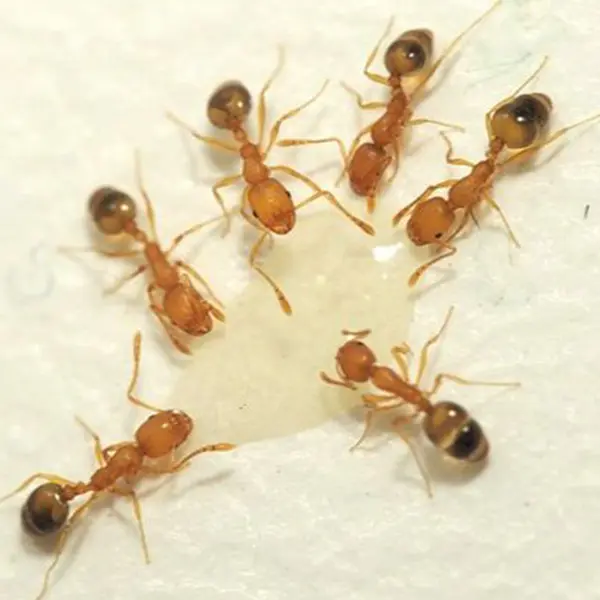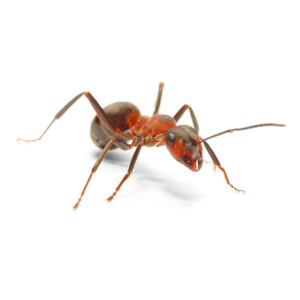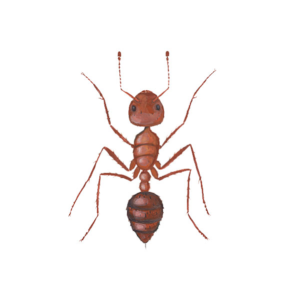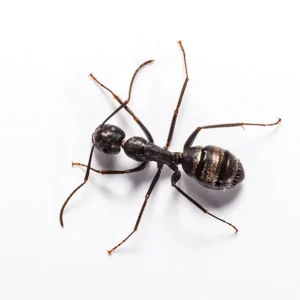Pharaoh Ant Identification
One of the most persistent and difficult ants species to control in the North Carolina area is the Pharaoh ant. Due to their large colonies, containing up to several million workers and thousands of queens, they are challenging to eliminate. An invasive species, they outnumber native ants, forcing them out of the area. Pharaoh ant colonies can quickly split and form new colonies when disrupted. Because of their splintering ability, they can spread throughout homes and buildings rapidly. Indoors, they will nest in any well-protected areas throughout a structure, but prefer lawns and gardens outdoors.
What Do Pharaoh Ants Look Like?
Pharaoh ants are small, typically measuring about 1/16 to 1/8 inch in length. They are light yellow to reddish-brown in color, with a darker abdomen. Their bodies are almost transparent, making them difficult to spot. This transparency and their size are key identifiers for these ants.
Signs of a Pharaoh Ant Infestation
Signs of a pharaoh ant infestation include seeing the ants themselves, often in kitchens and bathrooms where they are attracted to moisture and food. Their trails are less visible due to their small size, but they are often found near sources of warmth and water.
How to Get Rid of Pharaoh Ants?
To get rid of pharaoh ants, it’s essential to recognize their unique behavior, as they often form multiple colonies when threatened, making eradication difficult. Effective control typically involves using professional assistance, as baits specifically designed to attract pharaoh ants can be strategically placed to ensure they carry the poison back to their nests.
Partnering with our Bug Out team can provide the targeted treatments necessary to protect your home from pharaoh ants.
Habitat, Diet, Life Cycle & Bites
Where Do Pharaoh Ants Live?
Preferring areas near moisture, nests are located near a water resource, such as sprinkler systems and evaporative cooling units. Inside homes and businesses, Pharaoh ant nests are generally located in hard-to-reach locations near moisture, such as bathrooms, kitchens, under floors, and behind baseboards. In hospitals, nursing homes, and food-processing facilities, they appear in kitchens, laundries, boiler rooms, and around heating ducts, toilets, and pipes. Pharaoh ants utilize electrical wiring and plumbing pipes to travel from room to room, which allows them to gain access throughout an entire structure. Outdoors, they nest under debris or objects on the ground but are more commonly an indoor pest.
Diet of Pharaoh Ants
Searching for food round the clock, Pharaoh ants feed on sweets, proteins, and live or dead insects. They are particularly attracted to sugary foods, oily substances, and other kitchen scraps.
Life Cycle of Pharaoh Ants
The life cycle of pharaoh ants includes eggs, larvae, pupae, and adults. These ants are unique in their ability to create new colonies through a process called budding, where a group of workers and a queen leave an existing colony to form a new one.
Pharaoh Ant Bites
Although Pharaoh ants do not bite, they carry and transmit a number of dangerous pathogens to people and pets, including salmonella and streptococcus.
Are Pharaoh Ants Dangerous?
Due to their small size, they can access almost any space, contaminating food and food prep surfaces in kitchens and cafeterias as they forage. When they invade hospitals and nursing homes, they can contaminate sterile operating rooms, surgical equipment, and recovery rooms. Furthermore, most conventional pest control treatments do not control Pharaoh ants. If a Pharaoh ant infestation is suspected, it is recommended to contact a professional ant exterminator. In homes, they are a nuisance and can contaminate food but are not generally harmful to health.
How to Get Rid of Pharaoh Ants?
Eradicating pharaoh ants can be challenging due to their tendency to split into multiple colonies when threatened. Effective control often requires professional assistance, using baits that the ants carry back to their nest – that’s where Bug Out can help!
Pharaoh Ant Prevention Tips
Prevent pharaoh ants by maintaining cleanliness, particularly in kitchens and bathrooms. Seal all food in containers and fix leaks or sources of moisture. Regular inspections and sealing cracks can also help prevent infestations.
Need help with Pharaoh Ants control?
FAQ’s
Can You Ever Get Rid of Pharaoh Ants?
Yes, it is possible to get rid of pharaoh ants, but it often requires professional pest control strategies due to their ability to create multiple colonies quickly.
Are Pharaoh Ants Harmful to Your Health?
Pharaoh ants are not directly harmful to health in most home environments. However, in healthcare settings, they can potentially spread disease by contaminating sterile areas.
Why Do I Have Pharaoh Ants?
Pharaoh ants are often attracted to warm, humid environments with access to food. Poor sanitation, moisture, and accessible food sources can lead to infestations.





